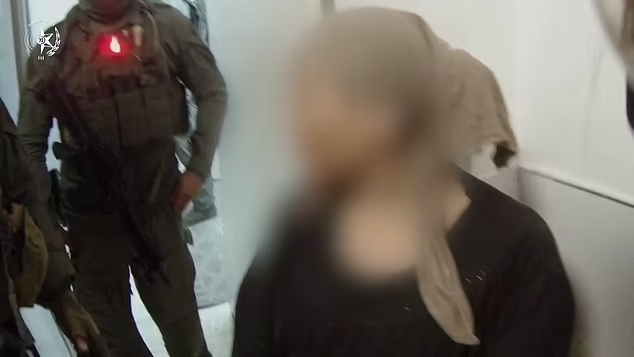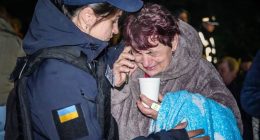DRAMATIC footage captured the moment armed policemen arrested Hamas leader Ismail Haniyeh’s sister for “praising the October 7 massacre”.
Sabah al-Salem Haniyeh, 57 was caught at her home in southern Israel after authorities found dozens of chilling texts she allegedly sent to her contacts supporting the terrorist attack – even calling for further “slaughter”.
Bodycam footage taken by the cops showed two unmarked vans packed with Israeli officers rushing up to her house in Tel Shiva.
The armed policemen can be seen raiding the building before arresting Sabah inside a room.
Haniyeh’s sister calmly surrendered herself to the cops as they put handcuffs on her.
Sabah was arrested on April 1 in a joint raid with the Shin Bet – and she has since been kept in police custody, Israel’s justice ministry said.
more in Israel-Hamas war
She has been accused of incitement and showing solidarity with a terror group after she allegedly cheered for the terror attack against Israel on October 7 that sparked the bloody war in Gaza.
The formal indictment suggests Sabah sent messages to dozens of contacts, including to her brother Ismail Haniyeh, praising the massacre and calling for further “slaughter”.
One of her messages mentioned in the indictment includes: “Oh God, count them and kill them and don’t leave any of them, Oh God.”
Police said that during the raid they also found evidence including secret documents that link her to “serious security offences”, the Times of Israel reports.
Most read in The Sun
Sabah is the sister of Ismail Haniyeh, the political head of Hamas
The terror boss, 61 has sanctuary in Qatar and lives in a billionaire penthouse apartment.
Haniyeh has been the tough-talking face of Hamas’ international diplomacy as war with Israel raged inside Gaza, where his family home was destroyed in an Israeli airstrike back in November.
Just a few days ago, he was told his three sons and four grandchildren had been reportedly killed in an Israeli airstrike.
Harrowing footage captured the terror boss nervously playing with his hands and staring down at the floor when told the news before carrying on with his day as usual.
The Hamas fiend looks in a state of shock and disbelief as he is slowly ushered out of the room, barely saying a word.
Reports online say he prayed to God for his sons’ mercy and acceptance in the clip before leaving.
He is then believed to have carried on with his hospital visit to see injured Gazans like normal.
Who is Ismail Haniyeh?

WIDELY considered as the overall leader of Hamas, Ismail Haniyeh is the political chief of the terror group.
Haniyeh was born in the Al-Shati refugee camp in the Gaza Strip in 1962.
He studied Arabic literature at the Islamic University of Gaza where he first got involved with Hamas.
Appointed to head a Hamas office in 1997, he grew in the ranks of the organization – and became the Prime Minister of the State of Palestine in 2006, but was shortly dismissed after a political conflict.
Haniyeh led Hamas in the Gaza Strip until February 2017, when he was replaced by Yahya Sinwar.
He was then elected as the chairman of Hamas’s Political Bureau – and soon moved to Qatar to lead political operations from his office in Doha.
has been the tough-talking face of Hamas’ international diplomacy as war with Israel raged inside Gaza
It comes as officials fear that only 40 out of the remaining 133 Israeli hostages captured by Hamas on October 7 are alive.
Shin Bet, Israel‘s domestic security agency, claims that intelligence on the hostage situation is much easier to gather due to Israel’s increased presence in Gaza.
A source is reported to have told the Daily Mail: “[Intelligence] is much easier to access than before October 7 when we had limited access to Gaza and we didn’t have a lot of possibilities of sources.
“The situation is completely different because we are there.”
These fears have stemmed, in part, from Hamas’ indications that they can not release 40 hostages who are either women or sick and elderly men
On April 18, Israel shared a horrific video appearing to show Yarden Bibas, the father of 10-month-old Kfir Bibas, being pummelled by a mob.
The video shows angry men swarming Yarden, who is sat in between two men on a motorbike.
The two men sitting on the bike with Yarden, and a couple of others standing next to it, unsuccessfully attempt to protect him from the onslaught.
The six-month-long war between Israel and Hamas was triggered by the terror group’s October 7 attacks that saw 1,200 people – mostly civilians – slaughtered.
The militants also dragged away some 250 hostages, of whom Israel estimates 129 either remain trapped in Gaza or are dead.
Israel responded to the terror atrocity with one of the deadliest and most destructive military onslaughts in recent history, killing nearly 34,000 Palestinians, according to Gaza’s Hamas-run health officials.
READ MORE SUN STORIES
The country has faced growing global opposition to the relentless fighting, which the UN and aid agencies have warned has pushed the north to the brink of famine.
How the hostages could become “bargaining chips
MIDDLE East analyst Dr Anahita Motazed Rad told The Sun how the opportunistic regime of Iran might tell Hamas to kill the hostages.
Not long after the October 7 attacks, Israeli news outlet Haaretz warned that the hostages would be at greater risk if Iran and Hezbollah became more actively involved in the conflict.
It suggested that the hostages would become “pawns in a regional power play”.
Dr Rad added: “The Iranian regime is the kind of regime that always are bargaining.”
The regime is already at its “weakest point”, she explains, with many Iranians already pushing for a change in government.
But as Iran becomes increasingly embroiled in conflict, with the country currently facing worldwide condemnation for its attack against Israel, it is thought Iran will scramble for leverage.
Part of their approach may include turning to proxy army Hamas in order to use the remaining hostages in their conflict with Israel.
Dr Rad told The Sun: “The Iranian regime is a kind of opportunistic regime.
“They see all the opportunities for their survival and even escalation of their status in the region, and influence in the region within the chaos.”
Source: Sun
















